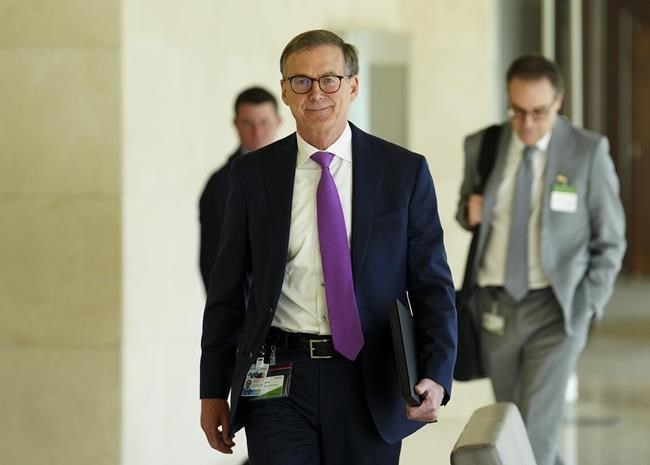OTTAWA — Bank of Canada governor Tiff Macklem navigates a political minefield every time he testifies before the House of Commons finance committee.Â
Four times a year, members of Parliament get the chance to question the governor on monetary policy.Â
At a time when inflation and interest rates are both high, MPs — particularly Opposition ones — are eager to ask him about politically charged issues.
Is the federal government spending too much? How much is carbon pricing pushing up prices? Would eliminating it bring interest rates down?
Mindful of the weight his words carry, the governor keeps his responses focused on the implications of fiscal policy on inflation.Â
But despite Macklem's best efforts, his words are often clipped and repackaged by politicians in service of their own narratives.
Parliamentary committees have become increasingly polarized over the course of the last two Liberal minority governments and have provided a venue for political theatre outside the House of Commons.Â
That was on full display Thursday when Conservatives sent out a news release following Macklem's appearance in committee, which said the governor had "confirmed that Trudeau's $61 billion in new spending is 'not helpful' in bringing inflation down and lowering interest rates."
Clips on X quickly circulated as well.
But what was missing was the fact that Macklem never singled out federal spending.
He noted provinces increased their spending, and it was largely deficit-financed.
"That has increased the contribution to growth from government," Macklem said in response to a question on whether fiscal and monetary policy are rowing in the same direction.Â
Macklem noted the central bank's April monetary policy report forecasts aggregate government spending will increase by 2.75 per cent this year.
That's up from its January forecast of 2.25 per cent, largely due to a slew of provincial budgets that increase spending.
Notably, the federal budget had not yet been presented when these forecasts were published.
"So yeah, that is not helpful in trying to get inflation down," Macklem said about the increased growth rate for spending by all levels of Canadian government taken together.
The Canadian Press asked the Bank of Canada whether the governor's response was accurately captured in the Conservative news release.
"We'll let the governor's testimony speak for itself," Paul Badertscher, the central bank's director of media relations, said in an email.
The Tories didn't respond to a question about whether they believe that provincial government spending has contributed to inflation.Â
Instead, they reiterated their interpretation of Macklem's comments.Â
"Macklem said government spending is 'not helpful' to efforts of bringing down inflation and interest rates," said spokesman Sebastian Skamski.Â
Because the federal Liberals increased overall spending in this year's budget, "it's clear" that Macklem was referring to "Justin Trudeau's spending," Skamski said.Â
After four years as governor during arguably the most economically tumultuous time in decades, Macklem is well-versed in how quickly the Bank of Canada can find itself caught in a political firestorm.
The central bank has taken heat from politicians of various stripes, union leaders and commentators alike.
Conservative Leader Pierre Poilievre even vowed to fire Macklem for the Bank of Canada's policy response to the pandemic. He has not repeated that promise in a while.Â
Even as Tory MPs now lean on Macklem's credibility as they try to make a case that Liberal decisions are fuelling inflation, government MPs are looking for his validation.Â
Liberals often craft questions to the governor that try to prod him into defending their government's fiscal track record and policies.Â
Stephen Gordon, an economics professor at the University of Laval, said this is far from the first time that politicians have tried to use the Bank of Canada to score political points.
He said the central bank's long-standing tradition is to not wade into politics or pass judgement on government policy.
"It always sort of takes fiscal policy as a given. It's not supposed to express an opinion about whether it's good or bad or not," he said.Â
Gordon said it's unfortunate that MPs are more focused on scoring political points than asking the governor substantive questions.
"The parliamentary committee meetings are really a missed opportunity for politicians to really understand what's going on with monetary policy. The focus on scoring media clips or gotcha quotes makes it harder for the bank," he said.Â
"The bank really would like people to understand how things are going."
This report by The Canadian Press was first published May 5, 2024.
Nojoud Al Mallees, The Canadian Press




